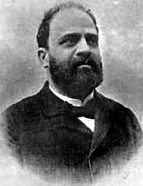

Tellingly, many unrelated or anonymous writings were wrongly attributed to him, as shown by small corrections made by Rogério Fernandes to his bibliography (Esboço bibliográfico da obra de F. Adolfo Coelho, 'Bibliographical Outline of the Work of F. Adolfo Coelho, 1973, pp. 203-231), suggesting that Adolfo Coelho was considered the author 'by default' of anything written on education in Portugal. The official nature of much of his work, a sign of recognition by the state, certainly lead to these exaggerations of authorship. On the other hand, this does not prepare us to find, in a creator and agent of educational policies, insistent praise for traditional forms of transmission of popular culture as a substitute for the literacy in which modern regimes deposited hope for transformation and the promotion of society and the individual (materialised in 1876 in Cartilha Maternal, by João de Deus, received with widespread controversy). ‘Illiterate people - states Coelho in Cultura e Analfabetismo (Culture and Illiteracy) - have their arts, industries, know-how, their education and even their pedagogy set to rules.’ (Cultura e Analfabetismo, 1916, p. 20). Taking sides in this debate (carefully studied by Sergio Campos Matos, 2002, among others), he added that 'the idea of homeland is by no means strange to those who ignore the arts of reading and writing and cannot know the history of the country through books', an idea that was echoed later on in the image of the Portuguese people outlined by dialectologist Lindley Cintra.
Here we find a key to understanding Adolfo Coelho's investment in the field of popular culture; it was not a simple stroll through folklore, as a companion to the histories of language and literature that dominated the construction of nineteenth-century philological discourse, but a collection and utilisation of traditional documents that need to appear and be enhanced (but not surpassed and suppressed) by the advent of reading and writing. This project brings together systematic collections such as Contos Populares Portugueses (Popular Portuguese Tales, 1879), Jogos e Rimas Infantis (Games and Nursery Rhymes, 1883), Materiais para o Estudo das Festas, Crenças e Costumes Populares Portugueses (Materials for the Study of Popular Portuguese Celebrations, Beliefs and Customs, 1880), large-scale studies such as Os Ciganos em Portugal (Gypsies in Portugal, 1892), or the Revista d’ethnologia e de glottologia (Journal of Ethnology and Glottology) which he founded in 1871 to articulate the issues of language, ethnology, mythography and folklore. In this respect, Adolfo Coelho’s work can neither be compared by the density of materials nor in the complexity of routes, with the achievements of Leite de Vasconcelos, but perhaps it is only fair to acknowledge Coelho's intuition and optimistic, forward looking thinking, which is absolutely absent from Leite's rich archaeology.
